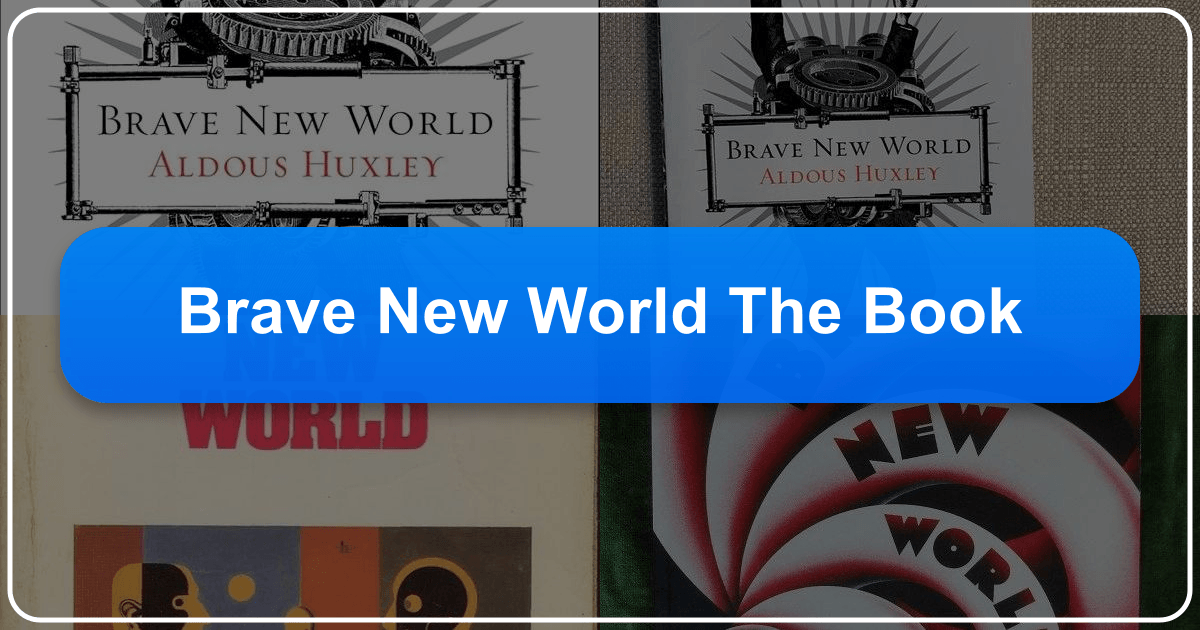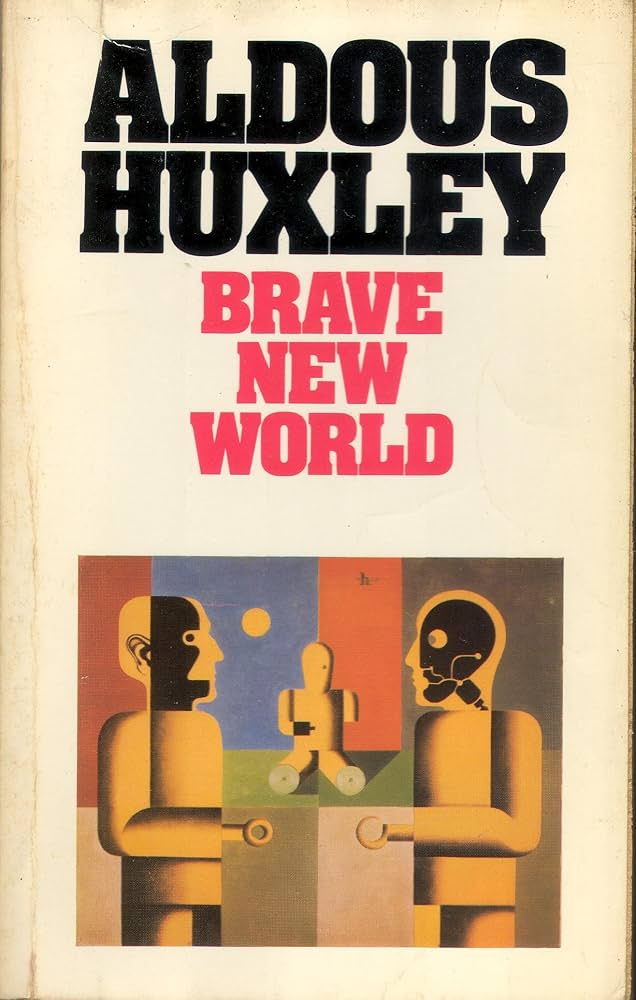Brave New World: A Deep Dive into Huxley's Dystopian Masterpiece

Aldous Huxley’s Brave New World, published in 1932, remains a chillingly relevant exploration of societal control and the potential pitfalls of technological advancement. This enduring classic of dystopian literature continues to captivate and disturb readers, prompting reflection on the nature of happiness, freedom, and human identity. This comprehensive analysis delves into the novel’s various aspects, examining its literary merit, historical context, and lasting cultural impact.
Genre, Context, and Literary Significance
Brave New World is primarily categorized as science fiction and dystopian fiction. Huxley masterfully blends scientific speculation with social satire, creating a chillingly plausible vision of a future where technological progress has come at the expense of human values. The novel’s dystopian setting, the World State, is a meticulously crafted society built on principles of stability and happiness achieved through technological control and social engineering. This isn’t a simple “evil empire” scenario; rather, Huxley presents a subtly insidious system where individual freedom and authentic emotion are suppressed for the sake of a seemingly harmonious, yet deeply unsettling, existence.
The novel’s literary significance lies in its powerful exploration of complex themes. Huxley probes the potential dangers of unchecked technological advancement, questioning whether progress always equates to betterment. He challenges the very definition of happiness, questioning whether a manufactured contentment devoid of genuine emotion and personal choice is truly desirable. The intricate social hierarchy of the World State, with its pre-determined castes, highlights the potential for oppression and inequality inherent in any system that seeks to control every aspect of human life. The use of scientific concepts, such as Bokanovsky’s Process and hypnopædia, isn’t merely plot device; they are integral to Huxley’s critique of societal manipulation and the dehumanizing aspects of mass production and standardization.

The novel’s masterful use of satire further elevates its literary status. Huxley’s satirical wit cuts deep, exposing the hypocrisy and superficiality of the World State’s claims to perfection. The characters, while often caricatures, serve as effective vehicles for conveying Huxley’s social commentary, forcing the reader to confront uncomfortable truths about human nature and the allure of societal control. The constant juxtaposition of the World State’s artificial happiness with the genuine, albeit flawed, humanity found in the Savage Reservation underscores the novel’s central conflict: the choice between a superficial utopia and a chaotic, yet inherently human, existence.
The Author: Aldous Huxley

Aldous Huxley (1894-1963) was a prominent English writer, known for his intellectual prowess and insightful social commentary. His writing style is characterized by its intellectual depth, wit, and sharp satirical observations. He was a prolific author, exploring various genres, including novels, essays, and poetry. Brave New World stands as a cornerstone of his literary output, reflecting his concerns about the potential dehumanizing effects of technological progress and societal control. His other works, such as Island and Brave New World Revisited, provide further insights into his philosophical perspective and demonstrate a consistent concern for individual freedom and the pursuit of authentic human experience.

Summaries and Educational Value
Brave New World depicts a technologically advanced society, the World State, that maintains stability through genetic engineering, conditioning, and drug use. Individuals are born into pre-determined social classes (castes), each with specific roles and levels of intelligence. The World State eliminates concepts like family, religion, and personal choice, prioritizing stability and happiness achieved through manufactured contentment. The protagonist, John, a “Savage” raised outside the World State, challenges the system’s artificial perfection. His struggles highlight the inherent value of individual expression and authentic human experience, even amidst hardship and conflict.
The novel’s educational value is significant. It offers a compelling framework for discussing ethical considerations related to technology, social engineering, and the pursuit of happiness. The World State’s system serves as a cautionary tale, highlighting the potential for societal control to suppress individual freedom and authentic human expression. The contrasting environments of the World State and the Savage Reservation prompt critical reflection on the nature of happiness, freedom, and the trade-offs involved in creating a seemingly ideal society. The novel also exposes the manipulative power of propaganda and the dangers of prioritizing societal stability above individual autonomy.
Reading Habits and Life Lessons
Engaging with Brave New World cultivates critical thinking skills. Readers are forced to question the societal structures and values presented in the novel, prompting introspection about their own perspectives on happiness, freedom, and technological progress. The story encourages exploration of alternative ways of organizing society and examines various ethical implications associated with technology and societal control. The novel’s lasting impact inspires reflection on the importance of maintaining human individuality in a world increasingly shaped by technology and mass culture. Life lessons drawn from the novel include the dangers of unchecked power, the importance of individual freedom and critical thinking, and the need for a balance between technological advancement and the preservation of human values.
Cultural Impact and Literary Influence
Brave New World’s cultural impact is immense. Its influence extends to subsequent dystopian fiction and broader cultural discussions about technology, societal control, and the nature of human experience. The term “Brave New World” itself has entered the lexicon as a descriptor for a dystopian or technologically advanced society.
The novel’s literary influence is profound. It has inspired countless works of literature, film, and television, with its themes and motifs frequently echoed in various media. Its impact on science fiction and dystopian fiction is particularly notable. The novel has also been frequently adapted and reinterpreted through various media, continuing to spark discourse and engage audiences worldwide. The sustained interest in Brave New World reflects its ability to provoke critical thinking and encourage ongoing discussion about the relationship between humanity and technology, the nature of societal control, and the potential risks associated with prioritizing societal stability over individual freedom.
Adaptations and Awards
Brave New World has been adapted numerous times into film, television, and theatre. These adaptations, while varying in their interpretations, consistently grapple with the novel’s central themes, offering different perspectives on Huxley’s cautionary tale for contemporary audiences. The novel’s lasting cultural relevance is evident in the continued interest in adapting and reinterpreting its themes for new generations. The multiple adaptations and critical acclaim demonstrate the novel’s sustained literary impact and its ongoing relevance to social and political discussions.
The novel has received numerous awards and accolades, including being featured on numerous lists of the greatest novels of the 20th century. Its recognition underscores its literary merit and enduring cultural significance, solidifying its place as a keystone in literary and philosophical discourse.
Conclusion
Aldous Huxley’s Brave New World is more than a mere work of science fiction; it’s a powerful social commentary that continues to resonate with readers decades after its publication. Its exploration of technology, societal control, and the nature of human experience remains intensely relevant. The novel’s enduring legacy lies not only in its literary merit and countless adaptations but also in its capacity to provoke crucial discussions about the path of human civilization and the preservation of our humanity in an ever-changing world. The ongoing relevance of its themes ensures that Brave New World will remain a significant and thought-provoking work for generations to come.